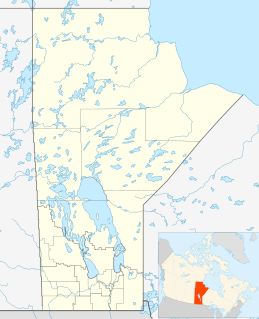Thomas Henry Seens (born September 8, 1895 [1] in Bradwardine, Manitoba; [2] year of death unknown) was a politician in Manitoba, Canada. He served in the Legislative Assembly of Manitoba as a Progressive Conservative from 1949 to 1953. [1]

Bradwardine is a historical location northeast of Virden in the Rural Municipality of Daly.

Manitoba is a province at the longitudinal centre of Canada. It is often considered one of the three prairie provinces and is Canada's fifth-most populous province with its estimated 1.3 million people. Manitoba covers 649,950 square kilometres (250,900 sq mi) with a widely varied landscape, stretching from the northern oceanic coastline to the southern border with the United States. The province is bordered by the provinces of Ontario to the east and Saskatchewan to the west, the territories of Nunavut to the north, and Northwest Territories to the northwest, and the U.S. states of North Dakota and Minnesota to the south.

Canada is a country in the northern part of North America. Its ten provinces and three territories extend from the Atlantic to the Pacific and northward into the Arctic Ocean, covering 9.98 million square kilometres, making it the world's second-largest country by total area. Its southern border with the United States, stretching some 8,891 kilometres (5,525 mi), is the world's longest bi-national land border. Canada's capital is Ottawa, and its three largest metropolitan areas are Toronto, Montreal, and Vancouver.
The son of G. H. Seens and Jane Whittington, Seens was educated in Tarbolton, Manitoba and worked in Manitoba as a farmer. He served as a councillor for sixteen years, and was a reeve from 1940 to 1950. Seens was also a member of the Masonic Lodge No. 115 in Rivers, Manitoba. In 1916, he married Annie Mae Wood. [2]
Rivers is an unincorporated urban community in the Riverdale Municipality within the Canadian province of Manitoba that held town status prior to January 1, 2015. It is located 40 kilometres northwest of Brandon. Rivers had a population of 1,193 people in the 2006 census. Rivers was named in 1908 after Sir Charles Rivers Wilson, Chairman of the Board of the Grand Trunk Pacific Railway. It is 473 metres above sea level, and is within the Westman Region. Agriculture, health and related businesses provide economics for the community and area.
He was elected to the Manitoba legislature in the 1949 provincial election, [1] defeating Liberal-Progressive candidate Matthew R. Sutherland by forty votes in the Lansdowne constituency. The Liberal-Progressives and Progressive Conservatives were part of a coalition government in Manitoba at the time of this election, although candidates from these parties campaigned against one another in certain constituencies.
The 1949 Manitoba general election was held on November 10, 1949 to elect Members of the Legislative Assembly of the Province of Manitoba, Canada.

The Manitoba Liberal Party is a political party in Manitoba, Canada. Its roots can be traced to the late nineteenth-century, following the province's creation in 1870.
Matthew Robinson Sutherland was a politician in Manitoba, Canada. He served in the Legislative Assembly of Manitoba as a Liberal-Progressive from 1936 to 1949, and again from 1953 to 1958.
In 1950, the Progressive Conservatives left the coalition government. Seens did not initially support this decision, but eventually decided to sit with the Progressive Conservative caucus in opposition. He lost to Sutherland by over 400 votes in the 1953 provincial election, and did not run for the legislature again. [1]
The 1953 Manitoba general election was held on June 8, 1953 to elect Members of the Legislative Assembly of the Province of Manitoba, Canada. This was the first election held in Manitoba after the breakup of a ten-year coalition government led by the Liberal-Progressives and Progressive Conservatives. The coalition, which began in 1940, was ended in 1950 when the Progressive Conservatives crossed to the opposition side.
